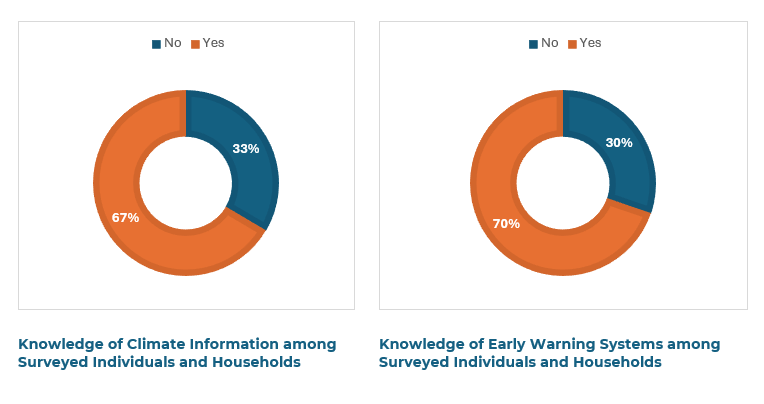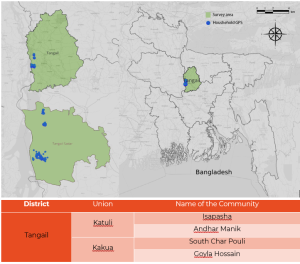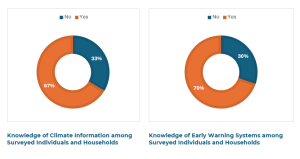
Introduction
Flood resilience is critical for communities in flood-prone areas, especially in regions like Tangail, Bangladesh. Our recent endline evaluation of the Integrated Flood Resilience Programme (Phase 2) sheds light on how well-prepared these communities are in facing climate challenges. Conducted in the Katuli and Kakua unions, this evaluation provides valuable insights into the knowledge and awareness of climate change and early warning systems among local residents. Understanding Climate Awareness
The evaluation revealed that approximately 66.5% of surveyed individuals and households possess knowledge about climate-related information. This is a promising sign, showing that a significant portion of the community is informed about climate matters, which is crucial for preparing and responding to natural disasters. However, the remaining 33.5% of the population lacks this awareness, indicating a need for ongoing education and outreach efforts.
Knowledge of Early Warning Systems
Early warning systems are a vital component of disaster preparedness. Our findings show that 69.8% of respondents are aware of early warning systems, while 30.3% still lack this knowledge. This level of awareness is a positive indicator of the community’s capacity to respond proactively to flood risks. Yet, it also highlights a gap that needs to be addressed to ensure comprehensive community preparedness.
Sources of Information
The evaluation identified the primary sources through which individuals and households receive information about early warning systems. The Red Crescent emerged as the most common source, accounting for 31.2% of responses. Other significant sources included neighbors (15.7%), public address systems (13.3%), and television (11.0%). Mobile phones also play a role, with 8.7% of respondents citing them as a source. These diverse channels underscore the importance of multi-faceted communication strategies in disseminating crucial information effectively.
Understanding Climate Awareness
The evaluation revealed that approximately 66.5% of surveyed individuals and households possess knowledge about climate-related information. This is a promising sign, showing that a significant portion of the community is informed about climate matters, which is crucial for preparing and responding to natural disasters. However, the remaining 33.5% of the population lacks this awareness, indicating a need for ongoing education and outreach efforts.
Knowledge of Early Warning Systems
Early warning systems are a vital component of disaster preparedness. Our findings show that 69.8% of respondents are aware of early warning systems, while 30.3% still lack this knowledge. This level of awareness is a positive indicator of the community’s capacity to respond proactively to flood risks. Yet, it also highlights a gap that needs to be addressed to ensure comprehensive community preparedness.
Sources of Information
The evaluation identified the primary sources through which individuals and households receive information about early warning systems. The Red Crescent emerged as the most common source, accounting for 31.2% of responses. Other significant sources included neighbors (15.7%), public address systems (13.3%), and television (11.0%). Mobile phones also play a role, with 8.7% of respondents citing them as a source. These diverse channels underscore the importance of multi-faceted communication strategies in disseminating crucial information effectively.
 Conclusion
The insights gained from this endline evaluation are vital for shaping future interventions aimed at enhancing flood resilience in Bangladesh. While significant progress has been made in raising awareness and knowledge about climate change and early warning systems, efforts must continue to reach those who remain uninformed. By leveraging various information channels, such as community organizations, media, and digital platforms, we can ensure that all community members are equipped with the knowledge they need to protect themselves and their livelihoods from the devastating impacts of floods.
Conclusion
The insights gained from this endline evaluation are vital for shaping future interventions aimed at enhancing flood resilience in Bangladesh. While significant progress has been made in raising awareness and knowledge about climate change and early warning systems, efforts must continue to reach those who remain uninformed. By leveraging various information channels, such as community organizations, media, and digital platforms, we can ensure that all community members are equipped with the knowledge they need to protect themselves and their livelihoods from the devastating impacts of floods.
 Understanding Climate Awareness
The evaluation revealed that approximately 66.5% of surveyed individuals and households possess knowledge about climate-related information. This is a promising sign, showing that a significant portion of the community is informed about climate matters, which is crucial for preparing and responding to natural disasters. However, the remaining 33.5% of the population lacks this awareness, indicating a need for ongoing education and outreach efforts.
Knowledge of Early Warning Systems
Early warning systems are a vital component of disaster preparedness. Our findings show that 69.8% of respondents are aware of early warning systems, while 30.3% still lack this knowledge. This level of awareness is a positive indicator of the community’s capacity to respond proactively to flood risks. Yet, it also highlights a gap that needs to be addressed to ensure comprehensive community preparedness.
Sources of Information
The evaluation identified the primary sources through which individuals and households receive information about early warning systems. The Red Crescent emerged as the most common source, accounting for 31.2% of responses. Other significant sources included neighbors (15.7%), public address systems (13.3%), and television (11.0%). Mobile phones also play a role, with 8.7% of respondents citing them as a source. These diverse channels underscore the importance of multi-faceted communication strategies in disseminating crucial information effectively.
Understanding Climate Awareness
The evaluation revealed that approximately 66.5% of surveyed individuals and households possess knowledge about climate-related information. This is a promising sign, showing that a significant portion of the community is informed about climate matters, which is crucial for preparing and responding to natural disasters. However, the remaining 33.5% of the population lacks this awareness, indicating a need for ongoing education and outreach efforts.
Knowledge of Early Warning Systems
Early warning systems are a vital component of disaster preparedness. Our findings show that 69.8% of respondents are aware of early warning systems, while 30.3% still lack this knowledge. This level of awareness is a positive indicator of the community’s capacity to respond proactively to flood risks. Yet, it also highlights a gap that needs to be addressed to ensure comprehensive community preparedness.
Sources of Information
The evaluation identified the primary sources through which individuals and households receive information about early warning systems. The Red Crescent emerged as the most common source, accounting for 31.2% of responses. Other significant sources included neighbors (15.7%), public address systems (13.3%), and television (11.0%). Mobile phones also play a role, with 8.7% of respondents citing them as a source. These diverse channels underscore the importance of multi-faceted communication strategies in disseminating crucial information effectively.
 Conclusion
The insights gained from this endline evaluation are vital for shaping future interventions aimed at enhancing flood resilience in Bangladesh. While significant progress has been made in raising awareness and knowledge about climate change and early warning systems, efforts must continue to reach those who remain uninformed. By leveraging various information channels, such as community organizations, media, and digital platforms, we can ensure that all community members are equipped with the knowledge they need to protect themselves and their livelihoods from the devastating impacts of floods.
Conclusion
The insights gained from this endline evaluation are vital for shaping future interventions aimed at enhancing flood resilience in Bangladesh. While significant progress has been made in raising awareness and knowledge about climate change and early warning systems, efforts must continue to reach those who remain uninformed. By leveraging various information channels, such as community organizations, media, and digital platforms, we can ensure that all community members are equipped with the knowledge they need to protect themselves and their livelihoods from the devastating impacts of floods. 
